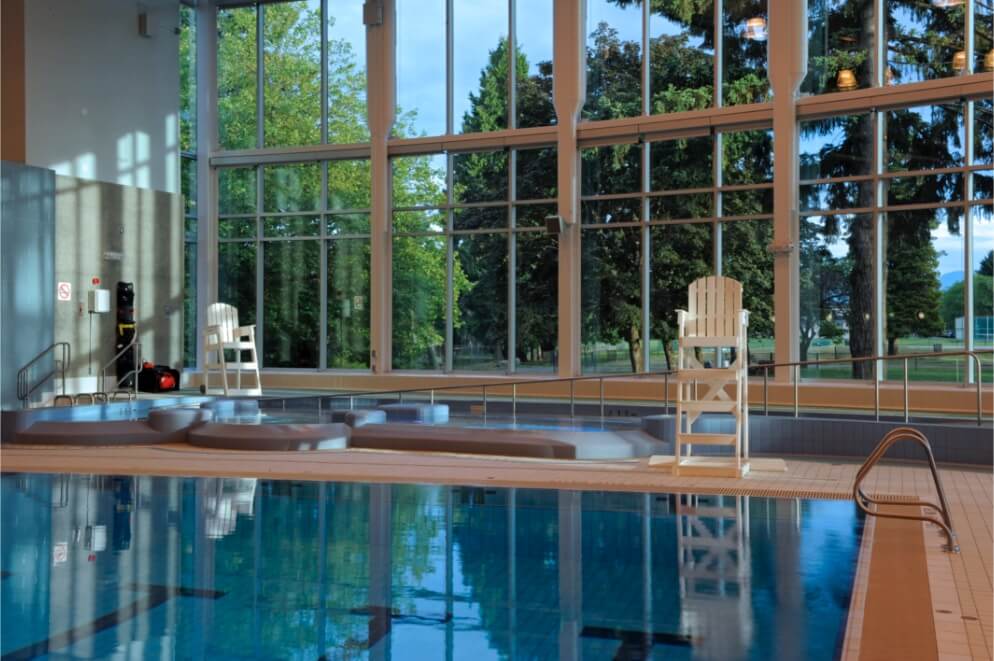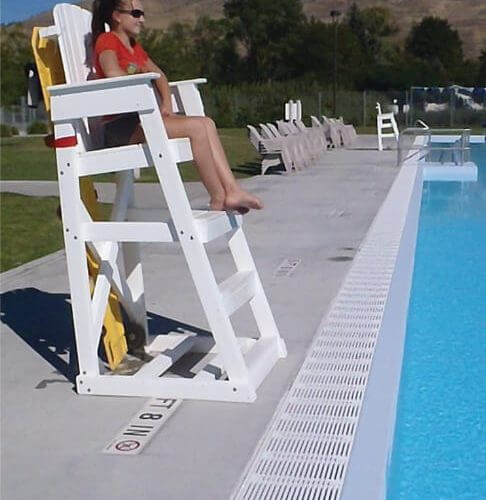Improving Work Environments help solve the Lifeguard Shortage

The importance of lifeguards and all of the options that facilities have when choosing the right chair, favoring the Mendota because of its durability and it is eco-friendly.
Improving Work Environments help solve the Lifeguard Shortage
As our world slowly returns to what it was before the consequences of COVID19, this summer is the first summer in which people are feeling a sense of safety to return to their normal lives, jobs, and hobbies. Spending time at the local swimming pool is no exception. The demand for swimming pool time and swimming lessons has increased, but unfortunately lifeguards are still in short supply. While in-person lifeguard certifications have resumed, the long-term effects of lockdowns have still left us with a lifeguard shortage causing many facilities to shorten operation hours or close entirely. Aquatic facilities have been working hard to bring back trained, veteran lifeguards as well as to recruit and train new lifeguards. So, how do we get them back? As with other industries, the goal to is provide a positive work environment that makes employees feel supported and attracted to what is ultimately one of the most amazing summer jobs ever! Savvy aquatic facilities are working to improve the work environment for lifeguards and other employees to attract and retain these invaluable members of the community.
Physical Work Environment
For several years, many industries have been providing a more positive work environment to attract and retain employees and have successfully attracted talent to their businesses with beautiful offices, comfortable chairs, extra perks in the lunchroom and fun team-building activities. Aquatic facilities are now competing with a multitude of other industries that are also working to attract employees, especially younger talent. Aquatic facilities have the sun, pool and fun built into their environment. However, like other industries have been doing for years, aquatic facilities need to realize one of the most important components to attracting and retaining lifeguards is to provide the best tools and equipment to drive success and improve employee morale. Safety equipment such as rescue tubes, whistles, CPR boards, and rescue sticks are obviously required but it’s also important for facilities to make their employees happy and comfortable while at work. A lifeguard is either at work rescuing a patron, patrolling the pool, or positioned in a chair overseeing the guests in the water. On average, a lifeguard will spend most of their time doing the latter. Office environments where employees are sitting most of the day stress the importance of a good desk chair for back support and comfort. Although a swimming pool is a different environment than an office, lifeguards should be treated with the same respect and provided with a chair and a supportive environment that make going to work a positive and compelling experience.
Choosing Lifeguard Chairs

Photo Courtesy: Spectrum Aquatics
We know a lifeguard’s job is to keep patrons safe, but what about their safety on the job? Aquatic facilities should take the time to choose equipment that facilitates the lifeguard’s ability to be comfortable and focus on the patron’s safety. Lifeguards should be posted in a sturdy structure that can survive in a corrosive environment where high levels of chlorine and other environmental stressors are present. Materials like wood are not suitable due to its increased rate at which it rots, splinters, and cracks. Spectrum’s Mendota chair, for example, is made of recycled high-density polyethylene material which does not absorb moisture. This key feature extends the longevity of the chair and eliminates the risk of it breaking or falling apart while a lifeguard is positioned at work.
When evaluating the right lifeguard chair for a facility, there are several other features incorporated into some lifeguard chairs make it easier for lifeguards to do their job. Protecting lifeguards from the harmful effects of UV is another key feature to consider when selecting a lifeguard chair. The last thing a facility wants is to have their lifeguards burned by the sun which could prevent a lifeguard from showing up to work. Having a portable lifeguard chair like the Mendota chair, allows lifeguard to easily move the chair from one post to the next, potentially moving out of direct sunlight to improve visibility, remove the lifeguard from direct sunshine or to move closer to particular sections of the pool where activity is the greatest—making it easier to keep an eye on patrons. Additionally, the Mendota chair has and umbrella and cup holder! Having an umbrella to block harmful sun exposure and a place to keep water to stay hydrated provide a more comfortable and safer work environment for lifeguards. The lifeguard chair really can improve a lifeguard’s work environment—to keep them comfortable and make them feel appreciated. Not to mention help them do their job better.
The break room & other perks
Aquatic facilities should never overlook simple perks that make lifeguards feel appreciated. A break room stocked with cold water bottles, electrolyte replacement drinks and healthy snacks goes a long way with making staff feel appreciated and cared for. Keeping a refrigerator packed with complementary apples, bananas, oranges, yogurt and protein bars is an inexpensive perk that will go a long way to help improve employee morale. Not to mention to ensure that your staff is physically fueled for a demanding day in the sun. Remember to also offer complimentary sunscreen, hats, aloe vera ointments and other sun protectants and burn remedies. In the city of Portland, Oregon, Mark Ross, Public Information Officer says that because the city’s aquatic facilities are looking to hire more lifeguards and swim instructors, they are promoting the perks and benefits of working at the city’s pools. “We welcome people who speak languages other than English to serve a growing and diverse Portland,” says Ross.
Employee appreciation hours
If you haven’t already done so, carve out some time for a regular employee appreciation hour. Create a weekly event where lifeguards and other staff get the pool to themselves with music, a taco bar or similar. Remember, your lifeguards and staff are a part of your community. And community is what today’s population is craving, especially in light of the isolation that so many people have experienced over the past few years. In fact, this trend has grown to the point that there is even a national lifeguard appreciation day! Some facilities have begun to use this day to start a regular employee appreciation event- even if it’s small to start. Remember that a little goes a long way! Employee appreciation days help build a positive work culture—keeping employees happy will also help ensure they come back again next summer! Andy Amato, Aquatic Program Supervisor for the City of Portland, Oregon says they recognize Lifeguard Rescues during their weekly staff meetings. “Our lifeguards get a pack of gummy lifesavers and a lifesaver lanyard,” says Amato. It’s just a little something to make lifeguards appreciated. “Our management team also selects a Lifeguard/Swim Instructor each session and they are given a bucket-hats and an extra whistle.”
The past three years have taught us many lessons and have allowed for us to experience a newfound gratitude for our essential workers, especially those that help keep us safer. While we slowly return to our hobbies and enjoy life outside of lockdown with our friends and families, it’s important to remember the employees who make recreational facilities run and function efficiently. Swimming pools, water parks, beaches, lakes, and other facilities that are surrounded by bodies of water cannot function without lifeguards. Aquatics professionals need to encourage our lifeguards to return to work now more than ever. It is our responsibility to show lifeguards that we will provide the best equipment possible to create a compliant, fun, and positive work environment so that everyone can once again enjoy a day in the water.





Or you could pay them more.